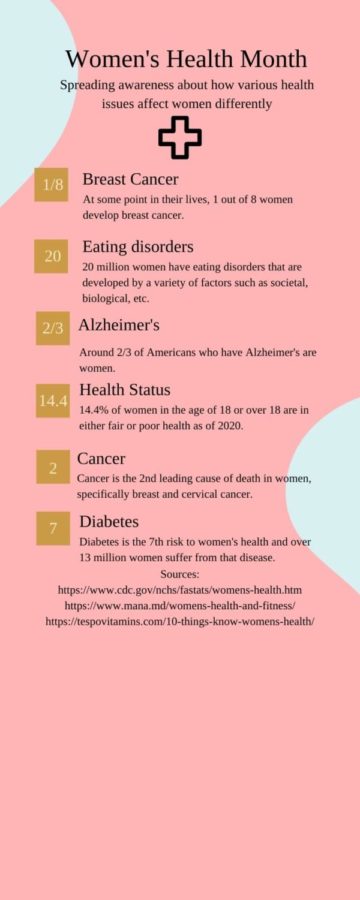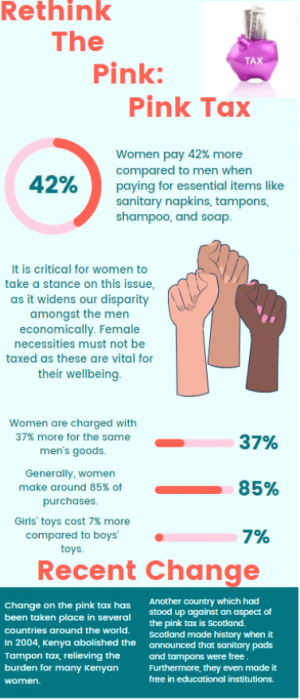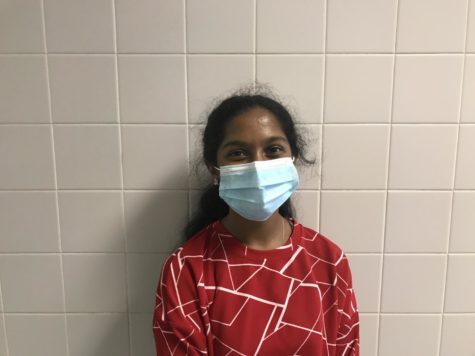May brings women’s health issues to light
May 28, 2022
One in 5 women die of heart disease and it is the leading cause of death for women in the US, according to the CDC. Recognized by the National Cervical Cancer Coalition, May is Women’s Health Month, a time dedicated to encouraging women to take care of their wellbeing and their specific body parts, such as their reproductive systems and secondary sex characteristics. In the last several decades, women’s health has become a major concern.
Furthermore, certain health conditions such as heart disease, stress and cancer affect women and men differently, but some of these conditions tend to affect women more severely. Due to the lack of awareness around health conditions specific to females and acknowledgement that there are vital resources and treatments geared toward female’s health, Women’s Health Month seeks to spread awareness and bring about change.
“Women are more likely to develop chronic conditions and since girls experience periods and pregnancy, it is important for them to recognize the basic precautions they should take to avoid such illnesses,” junior Sarayu Pulipati said.
Endometriosis
This disorder occurs when the tissue inside the uterus starts to grow outside the uterus. This tissue becomes trapped and does not exit the body. Endometriosis involving the ovaries can cause cysts to form, causing fertility problems and painful menstrual cycles. Although there isn’t a cure to this disorder yet, women can take pain medications, contraceptives, hormone therapy and various other treatments to relieve the pain from endometriosis.
“It is important to spread awareness about women’s health because women play a major role in reproduction, so without them or the maintenance of their wellbeing, a deteriorating and undesirable mutation could cause a variety of health problems,” junior Shriya Gunalan said.
Cervical Cancer
According to the Centers of Disease Control and Prevention, cervical cancer is when cancer cells grow in the cervix–the lower part of the uterus that connects to the vagina. Most women’s bodies’ immune systems, when exposed to human papillomavirus (HPV), are able to prevent the virus from spreading and causing harm; however, in about 0.7% of women, the virus persists and causes the cervical cells to become cancer cells. Taking the HPV vaccine, routine pap tests and regular checkups can help prevent this disease.
“Young girls should be educated about their reproductive health at school where girls and boys are placed in one room together and taught about how powerful a woman’s health is,” Gunalan said. “Additionally, girls should have open discussions with their parents or any trusted adults about reproductive health without having shame in talking about it because it is an important topic to comprehend that can allow one to make safer choices and have healthier outcomes in the future.”
Depression
While depression development and conditions differentiate from person to person, there are
also significant differences between the sexes as well. According to the Mayo Clinic, females are twice as likely to be diagnosed with depression compared to men. Mood swings and hormonal changes can increase the chances of girls developing depression; however, this alone does not cause depression.
Severe premenstrual problems such as abdominal bloating and anxiety can cause females to develop premenstrual dysphoric disorder that requires treatment. Additionally, pregnancy, postpartum depression, perimenopause–the period when a woman transitions into menopause–and menopause can increase the risk of depression along with other factors such as stress, poor sleep or removal of ovaries. Putting biology aside, depression can be caused by social factors as well, as the tendency for women to have unequal status compared to their male counterparts, an overload of work (many women work outside the home and have home responsibilities) and/or have faced sexual or physical abuse.
“Many still persist the anti-feminism stereotype where one believes that a woman should not be capable of performing certain tasks and have any leadership positions in society,” Gunalan said. “This heavy weight [anti-feminism stereotype] placed upon their shoulders could potentially cause uncertainty in one’s decisions in life and lead to depression.”
These health issues, along with many such as urinary tract infection (UTI), ovarian and breast cancer, strokes etc. specifically affect women and men differently. With this month shedding light on this principle notion, bringing awareness to how medical conditions affect females and how they can seek help is crucial to the well-being of many women across the nation.
“By having a month dedicated to women’s health because women are more likely to develop certain diseases than men and shining light on these issues can help women feel more included in society and overall benefit the well-being of society,” Pulipati said.






